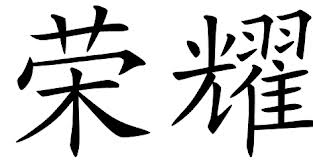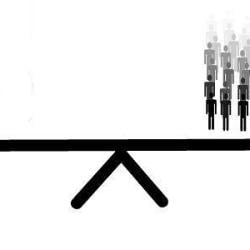“Face” is simply another way of talking about honor-shame (荣辱, róngrǔ). So, what some words someone might actually say?
(In my previous post, I gave an introductory Chinese lesson on the subject of “face.”)
 Directly using a phrase like “honor-shame” (荣辱, róngrǔ) is of course more abstract than “face” language. This is necessary when you are trying to explain certain “face” as a conceptual level. Remember, just become China is an honor shame culture doesn’t mean that people really “get it” at a conscious level. It’s like grammar––small children know how to speak properly, but it not until much later (if ever) that they grasp the rules behind what they are doing. In addition, many idioms explicitly use honor-shame language (荣辱言语, róngrǔ yányǔ).
Directly using a phrase like “honor-shame” (荣辱, róngrǔ) is of course more abstract than “face” language. This is necessary when you are trying to explain certain “face” as a conceptual level. Remember, just become China is an honor shame culture doesn’t mean that people really “get it” at a conscious level. It’s like grammar––small children know how to speak properly, but it not until much later (if ever) that they grasp the rules behind what they are doing. In addition, many idioms explicitly use honor-shame language (荣辱言语, róngrǔ yányǔ).
What is “Honor”?
That depends on the context.
The noun 尊荣 (zūnróng) is a pretty straightforward way of talking about honor-glory. Both characters are in countless other phrases. For example, many Christians talk about God’s glory (荣耀, róngyào) and how to “glorify” (荣耀, róngyào) Christ. However, you might want to vary your terms a bit and instead talk about “magnifying/praising” (推崇, tuīchóng) God. In essence, we want to call people to “esteem” or “venerate” God (尊崇神, zūnchóng shén). After all God has beauty or “glory” (荣光, róngguāng).
In more common speech, we should honor (尊重, zūnzhòng) a variety of people. Children are to “show filial respect” (孝敬, xiàojìng) to their parents. Of course, it’s only right to respect (尊敬, zūnjìng) any authority you meet. Therefore, it’s important to know people’s position (地位, dìwèi) or title (头衔, tóuxián). You also want to know how to “respectfully address” (尊称, zūnchēng) a person. For example, calling a foreigner (外国人, wàiguórén) a “老外” (lǎowài) is not necessarily an “honorific title/address” (尊称, zūnchēng), but it’s not a “derogatory name” (贬称, biǎnchēng), like “洋鬼子” (yángguǐzi).
Of course, it’s also not good to “people please” (讨好人, tǎohǎo rén) . It’s ok to “compliment” (恭维, gōngwéi) people, but Christians don’t simply want to “flatter” (奉承, fèngchéng) them. Completely out of the question is “kissing up”/“boot licking”/“kissing their rear”, which you’ll be glad to know Chinese literally translate as “slapping a horse’s buttocks” (拍马屁, pāi mǎpì).
“Honor” in the Christian Life
In the Christian life, we are most concerned about the Christ’s “renown/fame” (名望, míngwàng). If you want a little variety, you could say that Jesus have “prestige” (威望, wēiwàng). In short, all we do is for the same of Jesus’ “reputation” (名声, míngshēng). Jesus “status” (名分, míngfèn) or “fame/position” (名位, míngwèi), therefore we will “be glorified with him” (和他得荣, hé tā dé róng). In fact, whenever we “give our allegiance to” (效忠于, xiào zhōng yú ; 忠于, zhōngyú) Christ, we “identify with” (认同, rèntóng) him. As a result, we “share in his honor and shame” (和他荣辱与共, hé tā róngrǔ yǔgòng; or 和他共荣辱, hé tā gòngróngrǔ).
We “boast in Christ” (对基督夸口, duì jīdū kuākǒu;夸基督, kuā jīdū) because God has changed our “view of honor-shame” (荣辱观, róngrǔguān). We have “come under his name” (成为他的名下, chéngwéi tā de míngxià). Therefore, we want to “bring glory to the family name” (光耀门楣, guāngyào ménméi). Our Heavenly Father is the Creator King (创造之王, chuàngzào zhī wáng). Above all, we want to “bring him honor” (给他争光, gěi tā zhēngguāng).
I hope to write a post on “shame” soon. We’ll see if I can get to it.
Other Posts You may Like–––
Talking about “Face” in Chinese (www.patheos.com/blogs/jacksonwu)
Explaining the Trinity in Chinese Language (www.patheos.com/blogs/jacksonwu)
Chinese Characters in the Chinese New Testament (www.patheos.com/blogs/jacksonwu)
Related articles
- Justifying Honor and Shame in Romans (www.patheos.com/blogs/jacksonwu)
- “There is no fairness if you do not let us cheat” – Chinese parents (www.patheos.com/blogs/jacksonwu)
- Biblical Theology from a Chinese Perspective (www.patheos.com/blogs/jacksonwu)















